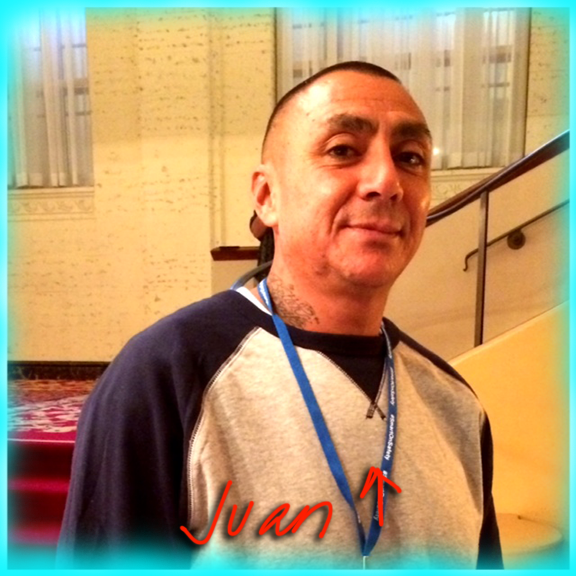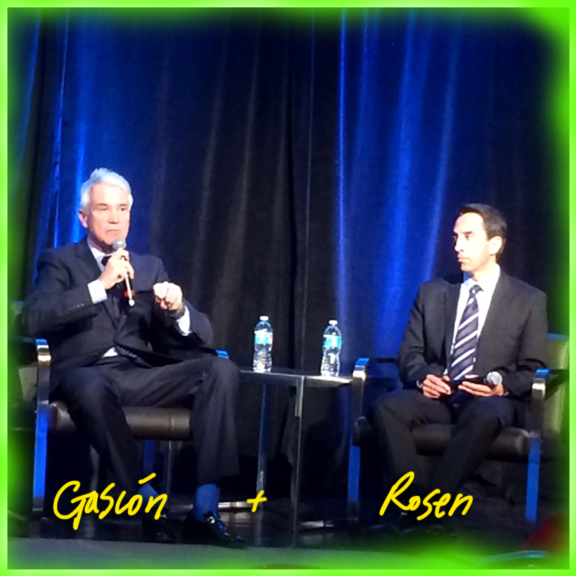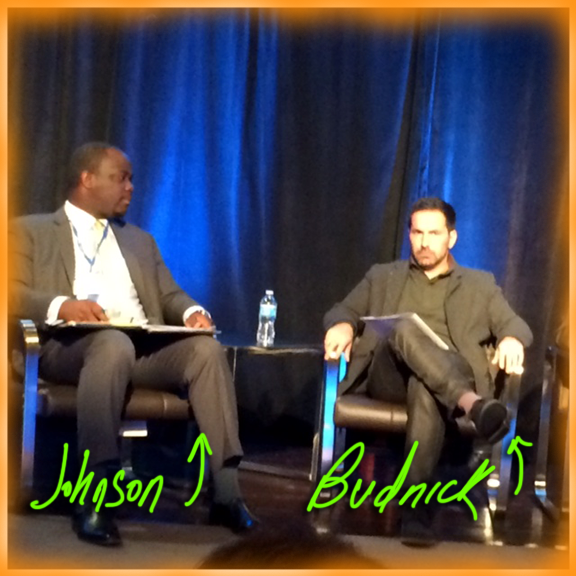
CALIFORNIA’S JUSTICE REFORM LEADERS GET TOGETHER AT THE “SMART ON SAFETY” SUMMIT TO TALK ABOUT “NEXT STEPS”
Juan, once homeless and addicted to heroin, was arrested when he broke into a warehouse. “It was empty, I just needed a place to sleep,” Juan said. The police found drugs on Juan, and charged him for possession, which was prosecuted as a felony. The arrest was not his first and he went to prison on what was originally a multi-year sentence. Juan said that he had been in and out of prison since 1983. “I became a real bad drug addict,” he said. “I burned every bridge in my family.”
After the 2014 passage of California’s Proposition 47, however, Juan was eligible for reduction of his conviction from a felony to a misdemeanor, and he was released earlier this year.
(Prop. 47 is the state initiative that reduced six non-serious felonies to misdemeanors.)
When he got out, Juan received little or no reentry assistance, and was fearful he’d slip back into his addiction. “I knew I needed more help,” he said. He’d heard about a drug rehab center called the Amity Foundation, and managed to snag a spot in their program. “I have a job today,” Juan said, tearing up as he explained that he now works at Ruth Chris Steakhouse in Beverly Hills and has stayed clean since his release from Amity. He has also repaired relationships with family members that he said he lost to his heroin addiction.
“All of the money I used to get went straight to the drugs…but today it goes to Chase,” he said, referring to the JP Morgan Chase Bank. “I have a debit card!” Juan said with a delighted grin. Now his family members ask him for a loan rather than the other way around, Juan said.
Juan told his story to a ballroom full of lawmakers, academics, and criminal justice reform advocates, with a sprinkling of state and local officials, all of whom gathered in LA’s Millennium Biltmore Hotel on Wednesday, November 4, the one-year anniversary of the passage of Prop. 47. The crowd showed up for this all-day “summit” called Smart on Safety to discuss next steps in the world of California’s justice reform.
D.A.’S TAKE THE STAGE TO TALK ABOUT HOW PROSECUTORS COULD MAKE A BIG DIFFERENCE
One of the day’s most talked about panels featured San Francisco District Attorney George Gascón and Santa Clara County DA Jeff Rosen, who are two of only three of the state’s district attorneys (out of 58) who publicly endorsed Prop. 47. The prosecutors talked about their separate paths to the realization that California’s criminal justice system was in need of serious restructuring. Gascon and Rosen each made the point that prosecutors are in a unique position to bring about meaningful reform if they widen their perspectives.
Telling the story of his journey through law enforcement, which included serving as Assistant Chief of the LAPD, and San Francisco Chief of Police, Gascón said that it became “increasingly obvious” to him that “the doors to the prisons and the jails” are controlled by district attorneys. “District attorneys are the ones who decide who gets prosecuted, how they’re going to get prosecuted,” and to a great degree, the length of their sentence. As a result, they also have great power to affect reform, he said.
DA Rosen, who recently traveled to Germany to tour that country’s progressive prison system, told of his own awakening from the punishment-focused mindset, “I began to understand that, first of all, the distinction between crime victim and defendant is often artificial, and many of the defendants we were prosecuting were victimized early in their lives…and that if we did a better job helping people that were victims of crime, we may have fewer defendants in the future.”
A LAUNDRY LIST OF NEXT STEPS
In a later panel, Robert Rooks, the organizing director for Californians for Safety and Justice, and the former national criminal justice director for the NAACP, laid out a list of five areas for justice reform in the state that he felt were the most important for the gathered crowd to consider. In that CSJ is the non-profit that was the main organizer behind the passage of Prop 47, audience members listened carefully.
Rooks’ five-point “blueprint for reform” contained the following:
1. “We believe that we must get Smart on Jails,” he said. “We have too many people that are stuck [in jail] because of the cash bond system.” He also said he was inspired by a new pilot program in seattle called LEAD—Law Enforcement Assisted Diversion—in which cops participate in referrals to community programs, pre-booking.
2. “We also need to be Smart on Sentencing,” he said. For example, “we have thousands people incarcerated today on a non-serious second strike offense…. ”
3. Next on Rooks’ list was Smart on Youth and Adult Sentences. “Prop 21 has been talked about a number of times today,” he said, referring to the California ballot initiative passed in 2000 that increased a variety of criminal penalties for crimes committed by youth, and made it far easier to transfer young law-breakers into the adult criminal justice system. “It’s so past time to stop having babies as young as 14 being tried as adults. So it’s time to go to the ballot to overturn prop 21.”
4. “Smart on Reentry” was next up. If reentry is done right, he said, and some of the present barriers to success are removed that prevent the formerly incarcerated from succeeding, public safety is greatly enhanced, “And it builds trust back in the system.”
5. Last Rooks pointed to Smart on Safety, which he said meant Investing “in programs to help people”—trauma recovery centers, mental health treatment programs, more funding for schools. “We have a billion dollars still locked up in the criminal justice system. We need to get that money out and invest it in programs in the community.”
SCOTT BUDNICK’S NEW PRODUCTION COMPANY AND THE IMPORTANCE OF PERSONAL TESTIMONY
Among the day’s the most persuasive voices calling for criminal justice reform was former film producer Scott Budnick, best known for producing the Hangover movie franchise, who left Hollywood behind to found the Anti-Recidivism Coalition (ARC).
Budnick was instrumental in pushing for the 2013 passage of California’s SB 260, a law that gave a second chance at parole to kids who were convicted of murder before the age of 18 and sentenced to life-without-parole. He also was a prime mover behind SB 261, which built on 260, expanding parole eligibility to age 23, and was signed into law this year.
When questioned by panel moderator, Alex Johnson, executive director of the Children’s Defense Fund, CA, Budnick said he thought it was the personal testimony of those locked up for youthful crimes that was, to a great degree, responsible for the surprising passage of SB 261.
“It was the stories of the people going into legislature, saying ‘This is who I was when I was 14. This is who I was when I was 20. I made the worst mistake of my life. I got locked up… The system didn’t change my life… I chose to change my life, and now I’m out, and this is what I’m doing.’ And no matter if we were sitting with democrats, moderate democrats, or republicans, those stories blew their minds. And that was the game changer.”
Budnick talked about when he got his own mind blown at California State Prison at Pelican Bay, where he and a small cadre of advocates and attorneys held a seminar with people who had been convicted as juveniles, who were now locked in solitary confinement, but who could qualify for parole consideration under 260 and 261.
One of the encounters Budnick had was with a man who was about 60 years old. “I can’t get it out of my memory,” said Budnick. The man had been incarcerated for around 40 years for a teenage crime. Thirty of those years had been spent in isolation. “And when we told him about SB 260, he started weeping….knowing that he had the ability to now come home,” Budnick continued. Because the man was still solitary, Budnick could not talk to him face-to-face. Instead “he stuck his little finger through the hole in the cage and he shook my finger and said, ‘You’re the first person I’ve ever touched in 30 years.’”
Among the reform targets that Budnick wants to focus on next, he said, are the sentencing “enhancements” now on the books in California that can turn a relatively short sentence into one of multiple decades for young people, particularly if that young person can be labeled a gang member.
Panel member, Elizabeth Calvin, a children’s rights attorney for Human Rights Watch, agreed and listed additional justice issues affecting kids that she has in her radar. Front and center for Calvin is the matter of solitary confinement for juveniles, and the process of deciding whether or not a young person will be tried as adult, a decision she noted was once was in the hands of judges, that now, she said, was determined by prosecutors “about 70 percent” of the time.
In order to share some of the compelling justice stories he and fellow activists have witnessed, Budnick announced that he was working to raise $300 million to launch a new social justice-focused film company. The mission, Budnick said, was solely “to tell the right stories, and change the narrative.”
FOUNDATIONS & JUSTICE REFORM
Philanthropic foundations, from the California Endowment, the Ford Foundation, the WK Kellogg Foundation, the Rosenberg Foundation, and the California Wellness Foundation, are all significant players in the state’s justice reform movement, and each of those foundations had representatives at the summit who talked about why their organizations were so committed.
For instance, Dr. Gail Christopher, who is the vice president and senior advisor at the WK Kellogg Foundation, talked about race and incarceration, arguing that that if we as a nation don’t own up to that “absurd notion,” of a “hierarchy of human value” which leads to “disparities in education…healthcare access, residential segregation, lack of affordable housing,” a large percentage of the next generation will find themselves behind bars, too.
Building on Dr. Christopher’s points, Dr. Robert K. Ross, President of the California Endowment said that justice reform work is “uncomfortable for many of our colleagues in the [philanthropy] field… because it forces us to confront issues of race and power.”
Foundations are much more comfortable funding research,” Dr. Ross said. “Getting the data out, and trusting that little elves will take those papers and turn them into really good public policies,” he continued.
Ross said that only within the last five years has the Endowment, a private foundation traditionally advocating for health access and equity in communities state-wide, focused on criminal justice reform as a health issue.
“We had our view of what a healthy community looked like. We had our data, and our slides, and our charts,” said Ross. “And then, the community told us what their definition of a healthy community was. Included in their definition…was the disruption and the dismantling of the prison pipeline. We could not escape that conversation anywhere we went.
As the day came to a close (following a bunch of discussions between heavy-hitter panelists about issues like the connection between community health care and public safety, and racial bias in policing, and arts in reentry and rehabilitation), civil rights attorney Van Jones praised California activists for helping to trigger the beginnings of bi-partisan reform on a national level. “The leadership in this room is changing the country,” Jones said. And still, miles remain on the road to equality in the criminal justice system.


